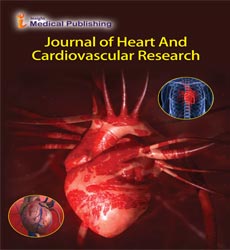ISSN : ISSN: 2576-1455
Journal of Heart and Cardiovascular Research
Examining Public Health Interventions: Heart Matters Trial Design
Emily Johnson*
Department of Cardiovascular Medicine, University of Amsterdam, Amsterdam, Netherlands
- *Corresponding Author:
- Emily Johnson
Department of Cardiovascular Medicine,
University of Amsterdam, Amsterdam,
Netherlands,
E-mail: Johnson@gmail.com
Received date: February 13, 2024, Manuscript No. IPJHCR-24-18821; Editor assigned date: February 16, 2024, PreQC No. IPJHCR-24-18821 (PQ); Reviewed date: March 01, 2024, QC No. IPJHCR-24-18821; Revised date: March 08, 2024, Manuscript No. IPJHCR-24-18821 (R); Published date: March 15, 2024, DOI: 10.36648/2576-1455.8.01.55
Citation: Johnson E (2024) Examining Public Health Interventions: Heart Matters Trial Design. J Heart Cardiovasc Res Vol.8 No.1: 55.
Introduction
Reperfusion therapies play a critical role in improving survival rates for individuals experiencing Acute Coronary Syndrome (ACS), particularly when administered promptly. Research indicates that even a relatively short delay of 30 minutes in receiving reperfusion treatment can significantly elevate the risk of mortality within a year. However, one of the major challenges in achieving optimal outcomes lies in patients not promptly recognizing the symptoms of ACS and subsequently delaying seeking appropriate medical attention. To address this issue, there is a widespread recommendation for international public education initiatives aimed at raising awareness about ACS, urging individuals to promptly contact Emergency Medical Services (EMS) for timely treatment. Evidence suggests that mass media campaigns targeting psychological barriers and providing actionable plans have yielded positive outcomes in enhancing ACS knowledge and encouraging appropriate treatment-seeking behaviors. Nonetheless, recent findings indicate that sustained exposure to such campaigns is crucial for long-term effectiveness. For example, the National Heart Foundation of Australia (NHFA) conducted a comprehensive four-year campaign focused on middle-aged adults, which garnered widespread reach and resulted in improved symptom knowledge among the general public, increased adoption of appropriate treatmentseeking behaviors, and a notable reduction in Out-of-Hospital Cardiac Arrest (OHCA) rates. Despite these achievements, the campaign's impact on symptom knowledge proved to be shortlived, and its high cost rendered it unsustainable.
Educational intervention
In light of these findings, a more effective strategy is proposed, which involves targeting regions characterized by high rates of ACS and low levels of symptom knowledge and treatment-seeking behaviors. By concentrating interventions in these areas, it is believed that greater effectiveness and sustainability can be achieved in improving outcomes for individuals affected by ACS. To address the existing disparities in addressing Acute Coronary Syndrome (ACS), the heart matters trial was initiated with the aim of delving into the impact of community-wide education. This education initiative provides comprehensive information regarding ACS risk factors and symptoms, while also tackling the known barriers hindering individuals from promptly calling Emergency Medical Services (EMS). Distinguished from prior community-based trials like the Real-time Assessment of Community Transmission (REACT) study, the heart matters trial focuses explicitly on regions characterized by the highest risk of Acute Myocardial Infarction (AMI). Additionally, it seeks to evaluate the enduring effects of the intervention over time. In response to these disparities, the heart matters trial was initiated with the objective of examining the impact of community-wide education initiatives.
Reperfusion therapies
These initiatives entail disseminating information regarding the risk factors and symptoms associated with Acute Coronary Syndrome (ACS), while also addressing the known obstacles hindering individuals from promptly calling Emergency Medical Services (EMS). Building upon the groundwork laid by prior community-based trials like the Real-time Assessment of Community Transmission (REACT) study, the heart matters trial takes a focused approach by specifically targeting regions identified as having the highest risk of Acute Myocardial Infarction (AMI). Moreover, it aims to assess the long-term consequences of the educational intervention. The underlying hypothesis driving the heart matters trial is that the implementation of an education program within these communities will lead to a heightened understanding of ACS, thereby fostering increased awareness of personal risk factors. Consequently, it is anticipated that individuals will demonstrate more proactive and appropriate behaviors in seeking treatment promptly upon experiencing symptoms of ACS. The heart matters study itself is designed as a community-based, pragmatic, cluster-randomized trial. Employing a stepped-wedge design, the trial features eight clusters transitioning from a control phase to an intervention phase sequentially every four months, interspersed with a two-month transition period. To mitigate the risk of contamination, two pairs of closely located Local Government Areas (LGAs) are coordinated to cross over simultaneously. Cluster randomization was deemed necessary due to the regional-level implementation of the intervention. The adoption of the stepped-wedge design was driven by considerations of cost-effectiveness and resource constraints, as well as the imperative to ensure equitable distribution across all LGAs.
Open Access Journals
- Aquaculture & Veterinary Science
- Chemistry & Chemical Sciences
- Clinical Sciences
- Engineering
- General Science
- Genetics & Molecular Biology
- Health Care & Nursing
- Immunology & Microbiology
- Materials Science
- Mathematics & Physics
- Medical Sciences
- Neurology & Psychiatry
- Oncology & Cancer Science
- Pharmaceutical Sciences
